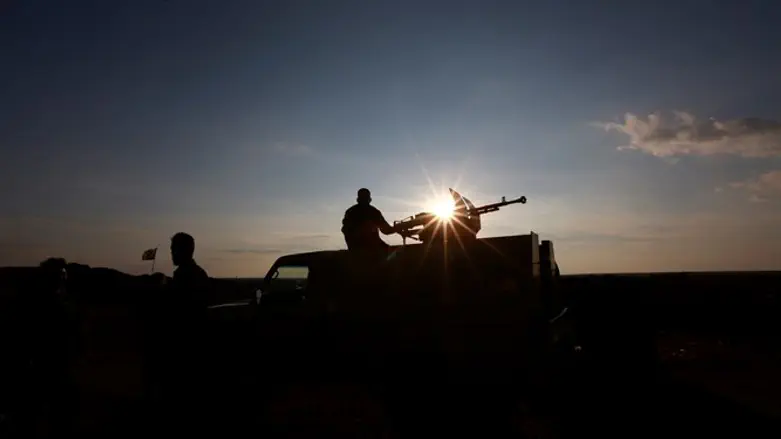
John Bolton, President Trump’s national security adviser, was just in Israel to discuss the withdrawal of US Special Forces from Syria.
At the same time, events in Iraq indicated that the presence of American soldiers in the country cannot be taken for granted anymore.
While in Israel, Bolton made statements indicating the Trump Administration was backtracking on its decision to withdraw US Special Forces from Syria.
The former US ambassador to the United Nations first warned the regime of Bashar al-Assad not to use chemical weapons again during or after the pull out of the US military from Syria.
“There is absolutely no change in the U.S. position against the use of chemical weapons by the Syrian regime and absolutely no change in our position that any use of chemical weapons would be met by a very strong response, as we’ve done twice before,” Bolton told reporters shortly before his plane landed at Ben Gurion Airport in Israel.
He later said that the withdrawal of American troops was dependent on finishing off the last remnants of ISIS in the war-torn country and on Turkey’s promise not to go after the Kurds once the U.S. withdraws from Syria.
Both Trump and Bolton affirmed on Sunday there was no specific timeline for the exit of the US military from Syria while the American national security adviser warned Iran against contemplating new aggressive acts against Israel.
Bolton said Iran should “think again” about its belligerent activities against the Jewish state and he later indicated the U.S. could maintain a military presence on the Syrian border with Iraq where the Americans have a base near the Al-Tanf border crossing.
His remarks contradicted Trump’s earlier statement that Iran could do whatever it wanted in Syria because the country was only sand and death.
“They can do what they want there, frankly,” the President said during a special cabinet meeting shortly after New Year.
On Monday, Trump effectively reversed his earlier statement about the immediate withdrawal of US troops from Syria when he fired off the following Tweet: “We're slowly sending our troops back home to be with their families, while at the same time, fighting ISIS remnants."
Some pundits are now saying that Bolton wants “to drag out withdrawal from Syria for as long as possible” and that the withdrawal is, in fact, off the table.
“Keeping U.S. forces around until Turkey pledges not to attack the YPG amounts to waiting forever,” Daniel Larison opined in an article for the American Conservative.
Indeed the Turkish regime of President Recep Tayyip Erdogan has already made clear that Bolton’s condition for the withdrawal was “irrational” and denounced the U.S. for siding with “terrorists”, meaning the Syrian Democratic Forces (SDF) dominated by the Kurdish YPG militia.
“There is no doubt that a terror group cannot be an ally of the U.S.,” Ibrahim Kalin a spokesman for Erdogan told state-controlled media in Turkey.
Kalin then claimed that Turkey’s sole aim in Syria is "to rescue Kurds from the tyranny and oppression of this terror group (YPG) and to ensure the safety of their lives and property."
Another problem with the intended US exit from Syria is Trump’s idea that his military can to carry out missions in Syria from Iraqi soil which will serve as the new bulwark against the Iranian entrenchment in both Syria and Iraq.
According to Iraqi media, the U.S. is already in the process of transferring troops and equipment from Syria to the Ein al-Assad base in western Iraq.
“A number of US military planes, carrying weapons and military equipment, arrived at Ein al-Assad airbase in the al-Baghdadi region in the town of Hit in Western al-Ramadi,” an unnamed Iraqi official told the outlet al-Wa’e.
The same source said he had witnessed the arrival of a large number of US military vehicles at Ein al-Assad in the days ahead of the arrival of the cargo planes.
However, the continuing presence of US Special Forces in Iraq cannot be taken for granted either.
Influential Iraqi politicians and the Iranian-backed Hashd al-Shaabi umbrella organization of Shiite militias in Iraq are working to oust the US military from their country.
The Sairon bloc of Shiite cleric Muqtada al-Sadr, the winner of the Iraqi elections in May 2018, repeated it will no longer accept the American military presence in Iraq.
“Our position is still the same, we reject US policies that do not respect the sovereignty of nations, their territorial integrity or the dignity of peoples,” Hamdallah Rikabi a spokesman for the Sairon bloc warned on Sunday.
Hadi al-Amiri, the leader of the Iranian-backed Fatah alliance, concurred and said that “the existence of the US troops is currently lacking any legal justification on Iraqi soil.“
While al-Amiri wants to solve the issue via the Iraqi parliament, a leader of Hashd al-Shaabi has different ideas about how to end the prolonged presence of US troops in Iraq.
Jawad Talibawi, a spokesperson for the Asaib Ahl al-Haq militia in Hashd al-Shaabi threatened to use force if the Iraqi parliament doesn’t act swiftly against the American presence in Iraq.
Talibawi called the presence of US soldiers in the streets of Baghdad “a violation of Iraq’s sovereignty.”
Iran is reportedly trying to recruit Sunni Arab tribes for an upcoming battle against the US Special Forces in Iraq, Atheel al-Nujaifi, the former governor of the Nineveh Province in northwest Iraq told reporters last week.
The United States has an estimated 5,000 soldiers on the ground in Iraq.